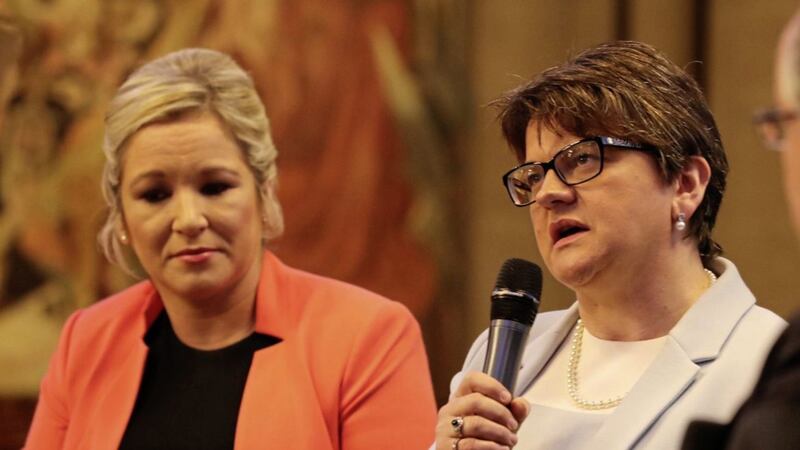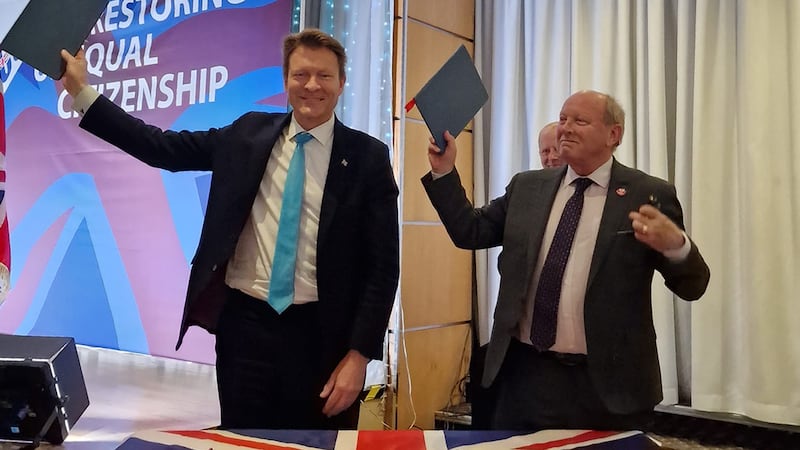Whenever I sink to new depths of pessimism I usually receive a couple of letters—kindly forwarded on by the Irish News—telling me to cheer up: “Honestly, Alex, the vast majority of people here want to live peacefully together and want a cross-community government up and running as soon as possible.” Hmm. Really?
The only problem with that kind of pie-eyed optimism is that in March, almost 55 per cent (in other words, a majority) of voters plumped for the DUP and Sinn Féin. And in so doing, they certainly weren’t encouraging Arlene and Michelle to compromise for the sake of a deal. In the general election in June—when a deal seemed further away than ever—the DUP/SF share actually rose to 66 per cent. So no surprise that there still isn’t a deal.
I get accused of ‘lazy analysis’ when I suggest that the blame for continuing failure should be shared reasonably equally by both parties. Yet the fact remains that both leaders are looking over their shoulders at the increasingly intemperate moods of their grassroots. Sinn Féin didn’t bring down Stormont because of RHI: they brought it down because their grassroots were fed up with lack of progress in a range of other areas and didn’t buy into the faux positivity of the joint Foster/McGuinness article in November 2016.
And I’m pretty sure the DUP would cut a deal on the Irish language if it weren’t for the hostility to it of their grassroots; as indicated in a recent poll for LucidTalk and in the party’s own internal consultation exercise a few months ago.
It’s also worth bearing in mind that the DUP and SF went out of their way to destroy David Trimble and Seamus Mallon between 1998 and 2003; then, having destroyed them, persuaded the British and Irish governments that they could negotiate and cut a much better deal of their own.
Yet here we are, 14 years later and the executive hasn’t met since last December. Sinn Féin accuses the DUP of serially reneging on promises and agreements (which is, in a number of instances, a legitimate accusation), but don’t explain why they gave the nod of approval to a programme for government in 2007, 2011 and 2016. They also forget that in March 2015 they backtracked on their own commitment to a welfare proposal in the Stormont House Agreement; and never once did they include an Irish language act in a programme for government.
So yes, they are both to blame. There may be wriggle room in which of them deserves the most blame, but they are both guilty. When it suits them they can cut a deal. When it doesn’t suit them they can drag it out for months. And while the Pollyanna Cross Community Choir may be bashing their tambourines and trying to raise the roof, I’m pretty sure than another election in a few weeks time would return the DUP and SF in numbers pretty similar to what they have now.
The big two are doing exactly what they say they’ll do in their tin-eared broadcasts. It’s the smaller parties who have the real electoral/political problems, because they are singularly failing to convince enough voters (particularly the young first timers and the regular non-voters) that they could do a better job.
For what it’s worth I’m the sort of pessimist who would love to be proved wrong. I would be delighted—and would eat all the humble pie required—if the DUP and SF cut a deal that came anywhere close to being stable, lasting, consensual and credible. I expect the worst: I expect a deal that collapses at the point of first contact with the next problem. I expect a bad deal because that’s the conclusion that the evidence of experience and observation leads me to. I will not put on a pair of rose-tinted glasses and treat you to a happy-clappy sing-along just to cheer you up.
Something else that needs to be said: just because I think that the present process is doomed to failure doesn’t mean—as some people suggest—that I am somehow anti-peace. I’m not. I supported the Good Friday Agreement and St Andrews because I believed that both represented a moment, an opportunity. But both have been tested to the point of destruction and it is not now possible to build success upon their ruins. Power-sharing becomes a redundant concept when the constitutional directions of those who would seek to share power are opposite and thoroughly contradictory. There really is no meeting point between unionists and republicans any more.
Let me finish with a plea: stop telling me I’m too gloomy. Stop telling me I’m wrong. Stop telling me that the promised land is just around the corner. Instead, present me with one—yes, just one—scrap of evidence that the deal-to-end-all-deals is waiting in the wings.








